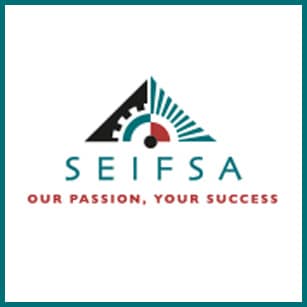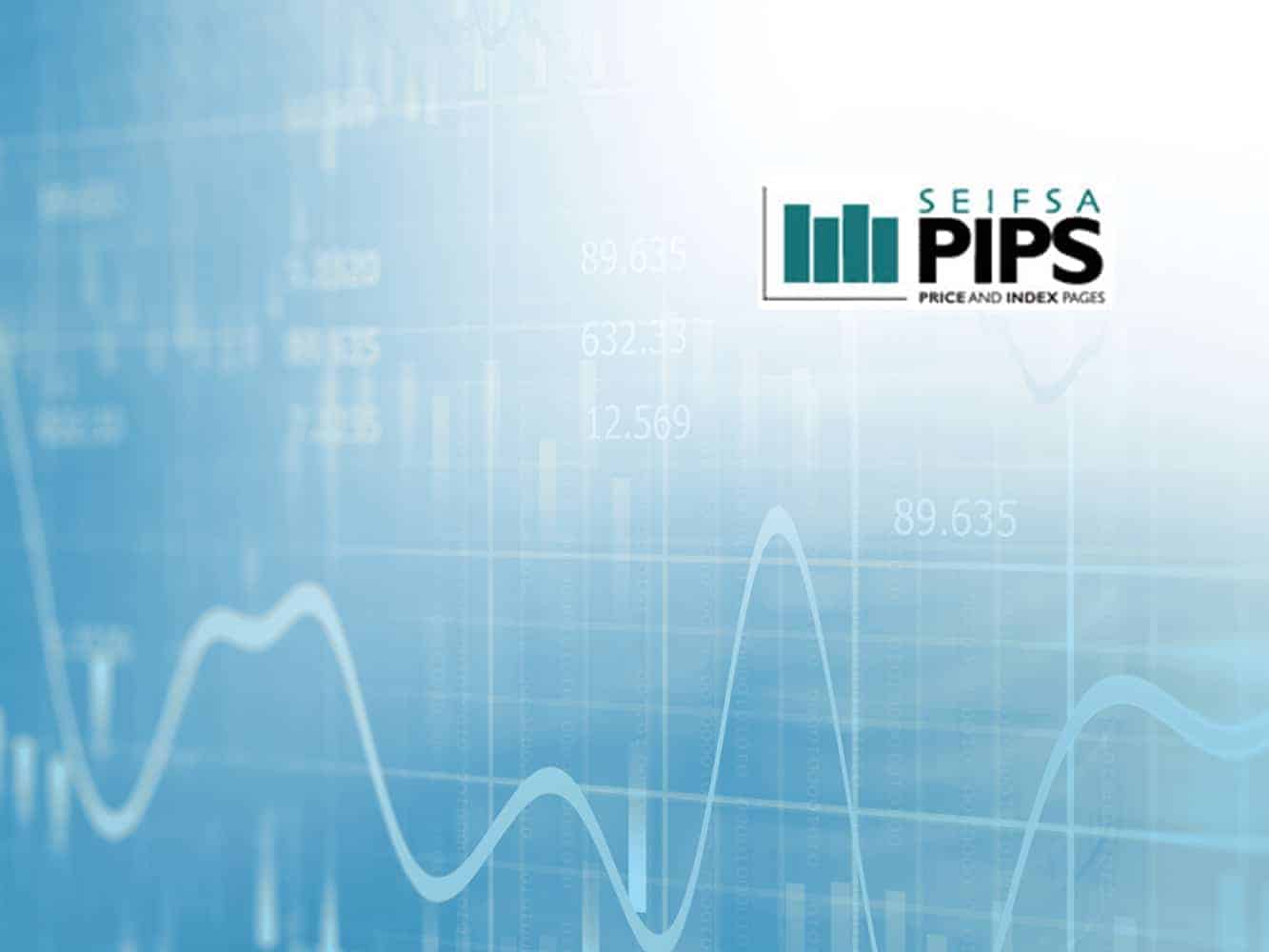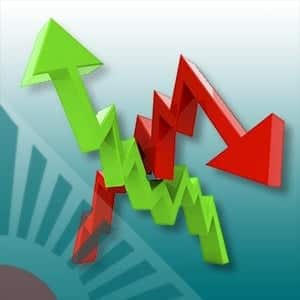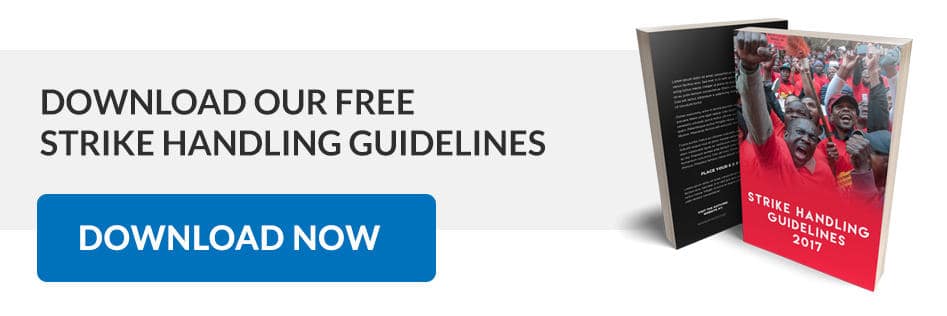WITH NEASA, FEAR IS THE KEY TO SUCCESS
NEVER UNDER-ESTIMATE THE POWER OF THE NEGATIVE
Dear Stakeholder
By now you will no doubt have had at least one of NEASA’s ever-wailing newsletters clogging your in-box since SEIFSA member Associations successfully concluded a three-year Settlement Agreement with all the industry trade unions in August. Those of us concerned about certainty and stability in the metals and engineering sector were pleased that such a settlement could be reached without even a single day lost to industrial action. After all, this is only the fourth three-year Agreement in SEIFSA’s 74-year history and the very first one concluded without industrial action in the past 10 years.
In its own eyes, NEASA has a special understanding of the dynamics of the metals and engineering industries. Its boring refrain is both simple and simplistic: “All our economic pain comes from SEIFSA”.
The organisation is simply incapable of advancing its agenda, such as it is, without reference to SEIFSA. It is as if SEIFSA is its currency.
There is little wonder, then, that when one objectively surveys almost twenty (20) years of NEASA’s participation on the Metals and Engineering Industries Bargaining Council, the only unbroken thread that can be discerned from its participation is its extraordinary and spectacular record of not having achieved a single thing for its constituency.
Zero. Zilch. Nada. Niks.
Given that, despite its ever shrill voice and the insults routinely hurled at all and sundry, NEASA has failed to secure any of its key objectives over the years, surely it is time for a rethink? In particular, NEASA needs explicitly to provide substance to its claims, to explain many of its bizarre actions and to inform all sobre-minded South Africans exactly what it would like SEIFSA, industry and other stakeholders to buy into and how its goals can be accomplished practically. In other words, let’s get to see the organisation’s vision for the future.
It is easy to criticize, to engage in penny-pinching and to throw barbs, but doing so without advancing any reasonable and constructive alternative is intellectually bankrupt.
Instead of distancing itself from the Bargaining Council, the unions and industry role players, NEASA needs to decide where it stands on the collective bargaining front, industry institutions and the ideals of fair, decent and collegial engagement.
NEASA’s biggest failing is that it usually knows roughly what it is against, but has absolutely no credible positive programme to define and realise concrete policy objectives.
NEASA claims to know all the ills that befall our industry, routinely bemoaning the role of SEIFSA, the trade unions, the Bargaining Council, Government and big business. The organisation excels at pointing fingers at anyone and everyone – except for itself! In our view, no organisation could possibly be more guilty of hypocrisy, short-sightedness and opportunism in equal measure.
NEASA claims to know where some of the sector’s problems come from:
- the often- repeated but factually incorrect “cosy relationship” between business (by which it means SEIFSA) and the trade unions;
- the assertion that collective bargaining has been usurped by scary ogres called “Captains of Industry”, at the expense of poor, helpless SMMEs; and
- the preposterous allegation of illegal deals being concluded in the course of industry collective bargaining processes.
The organisation has absolutely no shame. Its allegations get more outlandish and weirder and weirder by the day. The trouble is that NEASA has no real idea what to do to remedy any of these real or imagined problems. It attacks all and sundry, but has no equivalent philosophy concretely to get these issues addressed.
For the record:
- SEIFSA operates strictly in accordance with a mandate from its 23 member Associations; and
- SEIFSA represents all employers, both BIG and SMALL.
The vast majority of companies that are members of our Associations are small: a whopping 66% of our collective member companies employ fewer than 50 people. Therefore, contrary to NEASA’s nauseating, self-serving propaganda, we always have the best interests of all employers at heart, including small employers who represent two-thirds of our constituency.
Regrettably, we cannot but liken NEASA’s behaviour to that of North Korean dictator Kim Jung-un. Like the Korean dictator, NEASA excels at sabre rattling and declaring imaginary wars, but is very poor when it comes to searching for lasting solutions.
So, dear reader, never under-estimate the power of the negative. Scare tactics tend to resonate. As President Bill Clinton commented after the November 2016 US election that voted Donald Trump into office: “It’s highly complicated: people don’t like negative, divisive environments – but they frequently reward them in elections.”
As French philosopher Voltaire put it: “I disapprove of what you say, but I’ll defend to the death your right to say it.”
Accordingly, we detest NEASA’s divisive bile, but we will defend the organisation’s right to spew it. We do caution very strongly, though, that you, dear reader, do not swallow it holus-bolus.
Kaizer M. Nyatsumba Lucio Trentini
Chief Executive Officer Operations Director
SEIFSA STRONGLY OPPOSED TO ESKOM’S PROPOSED ELECTRICITY TARIFF HIKE
JOHANNESBURG, 26 OCTOBER 2017 – The Steel and Engineering Industries Federation of Southern Africa (SEIFSA) has expressed strong opposition to Eskom’s application to the National Energy Regulator of South Africa (NERSA), saying such an adjustment would cause great harm to the metals and engineering sector.
In a submission to NERSA, SEIFSA Chief Economist Michael Ade said the metals and engineering sector is still struggling to meet the high pre-crisis demand levels attained in 2007, with recovery in production having been modest at best.
“If the tariff increase application goes through, it will be a critical setback for the sector’s productivity. The sector exports 40 percent of its production and international competitiveness is vital for its survival. An inevitable consequence of the proposed 19.9 percent hike by Eskom will be more loss of jobs,” said Dr Ade.
He said that high electricity tariffs add to production costs, a situation simultaneously accompanied by the declining average change in selling prices received by local producers, and squeezes profit margins. He said that although production had just recently picked up in the sector, domestic demand conditions are still tough.
Dr Ade cautioned that excessive electricity tariff increases will eventually stifle Eskom’s supply in the long term as large energy-intensive sectors progressively cut down on demand and install their own powerful diesel generators to mitigate costs.
He said that, in the event that NERSA felt that an electricity tariff increase was necessary, then such an adjustment would have to be “at a much lower percentage that has been requested”.
Dr Ade said the metals and engineering sector’s share in manufacturing output is nearly 30 percent and it contributes to approximately 3.6 percent of the country’s gross domestic product. He added that last year the sector employed around 480 000 people directly.
ENDS
Issued by:
Jackie Molose
Marketing, Sales and Communications Executive
Tel: (011) 298 9411 and 082 602 1725
Email: jackie@seifsa.co.za
Web: www.seifsa.co.za
SEIFSA is a National Federation representing 23 independent employer Associations in the metals and engineering industries, with a combined membership of 1600 companies employing around 200 000 employees. The Federation was formed in 1943 and its member companies range from giant steel-making corporations to micro-enterprises employing few than 50 people.
SEIFSA WELCOMES PPI DATA IMPROVEMENT, BUT CAUTIONS AGAINST VOLATILE RAND
JOHANNESBURG, 27 OCTOBER 2017 – The increase in producer prices in September 2017 provides some much-needed comfort for producers, the Steel and Engineering Industries Federation of Southern Africa (SEIFSA) said today.
Commenting on the latest data on Producer Price Index (PPI) for intermediate manufactured goods released by Statistics South Africa, SEIFSA Economist Marique Kruger said the industry can be encouraged by the latest data, which show the PPI for intermediate goods remaining in an expansionary terrain for three consecutive months.
“This indicates a continued improvement in factory gate prices and operating business conditions in the metals and engineering (M&E)
sector. The data provide some relief for producers in the sector, who are beginning to derive the benefit of a modest recovery in domestic demand and declining costs,” Ms Kruger said.
She said this was consistent with SEIFSA’s input cost index which decreased to 0.9 percent in September 2017, when compared to 1.7
percent recorded in August. She said the improvement in the latest PPI data was generally in line with an increase in the broader PPI for final manufactured goods, which recorded an annual change of 5.2% in September 2017, compared with 4.2% in August 2017.
The Statistics South Africa data showed that the PPI for intermediate manufactured goods rose to 2.1 percent in September 2017, up from 2
percent in August.
Ms Kruger said that this was encouraging when viewed “against the backdrop of Finance Minister Malusi Gigaba’s bleak news in his Medium-Term Budget Policy Statement (MTBPS) yesterday, which highlighted a tight economic environment characterised by poor tax
efforts and tax morale, expanding government expenditure, ballooning deficits and high debt levels”.
However, Ms Kruger cautioned that although the PPI for intermediate goods in the M&E sector provides a glimmer of hope, economic activity within the sector and broader manufacturing will remain constrained by depressed business and consumer confidence levels that have been linked to perceived policy uncertainty and political turmoil. She said these will definitely keep producer prices volatile in the near term, thus making it very difficult for businesses to plan in advance and contain costs.
Ms Kruger expressed “grave concern” about the latest economic and political developments, which have the potential to quickly reverse the
positive growth trajectory recorded in the second quarter of 2017.
“In an atmosphere of generally low business and consumer confidence, low domestic demand, structural challenges and political uncertainty, the Finance Minister’s bleak news from yesterday’s speech raised more questions than providing answers,” she said.
Ms Kruger also raised disquiet about the oscillating rand’s effect on the economy, saying that a depreciating rand would be less beneficial for inflation, imported input costs and margins of companies in the M&E sector.
“The M&E sector is relatively small and open, hence volatility in price trends and the variables that impact the price trends does not augur well for it. A positive differential in the selling price inflation and input cost inflation needs to be maintained in order for the sector to stay attractive for existing and new investments,” Ms Kruger argued.
ENDS
Issued by:
Jackie Molose
Marketing, Sales and Communications Executive
Tel: (011) 298 9411 and 082 602 1725
Email: jackie@seifsa.co.za
Web: www.seifsa.co.za
SEIFSA is a National Federation representing 23 independent employer Associations in the metals and engineering industries, with a combined membership of 1600 companies employing around 200 000 employees. The Federation was formed in 1943 and its member companies range from giantsteel-making corporations to micro-enterprises employing few than 50 people.
CONSUMER PRICE INFLATION FIGURES PLACE RESERVE BANK UNDER PRESSURE
JOHANNESBURG, 18 OCTOBER 2017 – The Consumer Price Inflation (CPI) figures released by Statistics South Africa earlier today place the Reserve Bank in a difficult position on whether or not to continue implementing a more gradual policy stance, Steel and Engineering Industries Federation of Southern Africa economist Marique Kruger said today.
She was speaking following Statistics South Africa’s disclosure that the annual consumer price inflation was 5,1 percent in September 2017, up from 4,8 percent in August 2017, indicting a 0,5 percent month-on- month increase in September 2017.
“The latest figures were the second consecutive year-on- year increase since inflation was at a low of 4,6 percent in July 2017, matching the lowest figure recorded almost two years ago. The latest figures were also the sixth consecutive reading that had fallen within the Reserve Bank’s target range of 3 percent to 6 percent,” Ms Kruger said.
She said the inflationary trend was largely assisted by the recent increase in oil and petrol prices and a weakening exchange rate. She said these factors also accounted for the increase in inflation numbers. This has concomitantly led to an increase in transportation costs and the cost of doing business for the companies in the M&E sector in particular.
“Increasing petrol prices, the volatile rand and high policy uncertainty are expected to continue to play into the inflation figures for the coming months, leading to the ANC national policy conference in December 2017. Therefore, inflation will be of great concern to the South African Reserve Bank, which is keenly watching local and international developments,” said Ms Kruger.
ENDS
Issued by:
Jackie Molose
Marketing, Sales and Communications Executive
Tel: (011) 298 9411 and 082 602 1725
Email: jackie@seifsa.co.za
SEIFSA PRESIDENT SERIOUSLY CONCERNED ABOUT SLOW PACE OF TRANSFORMATION IN THE SECTOR AND THE GOVERNMENT’S FAILURE TO ARREST CORRUPTION
Johannesburg, 16 October 2017 – Steel and Engineering Industries Federation of Southern Africa (SEIFSA) President Michael Pimstein has bemoaned the slow pace of transformation in the metals and engineering sector and called on companies to embrace change in the best interest of the country.
Delivering his presidential address in Parktown on Friday morning, shortly after the Federation’s annual general meeting, Mr Pimstein said the slow pace of transformation in the sector continued to be a matter of concern, and urged companies “to embrace change and advocate for transformation”. He said that the manufacturing industry in general and the metals and engineering sector in particular were desperately in need of thorough-going transformation “not only when it comes to general business ownership, but also with regards to occupation of senior leadership.”
“As a sector, we need to embrace change and advocate transformation. Not only is it in South Africa’s interest for that to happen, but it is also fundamentally in business’s own long-term interest. It is of critical importance that a concerted effort is made by the sector towards creating meaningful opportunities for all South Africans to play a crucial role in taking our industry to new heights,” Mr Pimstein said.
He said that it reflected very poorly on South Africa that the country was placed number 165 out of 175 countries currently reflecting an economic growth rate better than zero. This growth rate, he said, was around the same position as that of the Republic of Congo, but significantly below rates experienced in Ethiopia (7,5%), Tanzania and Senegal (6,8%), Ghana (5,8%), Malawi and Mozambique (4,5%), Botswana (4,1%), Namibia and Egypt (3,5%) and even Zimbabwe (2%).
He said South Africa’s share of the global economy was declining year on year, with the country’s position aggravated by the fact that “our economic growth continues to weaken whilst the rest of the world’s is improving”.
Mr Pimstein said that business in South Africa operated in an environment challenged by weak economic conditions “and a radical disregard for good governance throughout the governing hierarchy.”
“Failure to respond to allegations of State capture and corruption, ineffective Boards and delinquent management, political (and other) appointees that disregard accountability, integrity and competence as non-negotiable elements of office, selective law enforcement, absence of a sound strategic plan to recover from junk status, inability and/or reluctance to eliminate wasteful expenditure by organs of the State, shocking audit revelations from the Auditor General, ill-considered regulatory impositions and attacks on independent institutions such as the South African Reserve Bank would be alarming if considered individually.
Together, they indicate contempt for good and responsible governance,” he said.
He said that it was time for business, labour, civil society, community bodies and
politicians to take South Africa country back: “Ultimately, we must recognise the
resilience, character and goodwill of most South Africans. Standing together against all
the evils permeating our activities would be a good start.”
Mr Pimstein said SEIFSA’s strategic role in influencing policy could not be underestimated. He said that it was important for all stakeholders within the sector to work together, with Government, business and labour partnering to find solutions to increase the country’s GDP significantly and, in the process, South Africa’s apparent steel consumption “beyond the moribund five million tons level”.
He said South Africa also needed to reposition for growth in key areas such as agriculture and agro-processing, mining and related beneficiation, manufacturing, urban development and rural infrastructure and development, water supply and storage, desalination and recovery, transport and logistics, as well as energy and tourism.
“We simply have to create decent jobs and, to sustain them, we have to grow oureconomic pie,” Mr Pimstein said.
Mr Pimstein welcomed the fact that the 2017 wage negotiations in the sector were concluded without any strike action, marking the fourth time in SEIFSA’s 74-year history that a three-year agreement was concluded with labour and “the first time in the last 10 years that this has been achieved without industrial action.”
Guest speaker JP Landman told the gathering how South Africa’s increase in population growth and a concomitant 1.23 percent increase in immigration had contributed to the decline in economic growth from 1.5 percent in 2014 to a possible 0,7 percent in 2017.
“I’ve seen this movie before. In 1985 South Africa faced similar economic challenges,” he said. “But despite the country’s economic and political woes, South Africa has an “open society that will enable it to make an about turn”.
Professor Landman said he remained optimistic about the country’s future because of a number of institutional and open-society forces in the country, such as the ability to replace the government, a free and pluralistic media, an independent judiciary and an outspoken civil society, among others.
“The bottom line for growth in South Africa would be a journey from traditionalism to modernism.To get onto this journey, the country needs to embrace the world by selling the world what it wants and taking what it can give you,“ he argued.
The Presidential Breakfast was preceded by a SEIFSA AGM, at which Industrial Services Holdings CEO Peter Amm, Auto Industrial Group CEO Andrea Moz and Zimco Group Human Resources Manager Ellen Veldhoven were elected onto the Board as Non-Executive Directors.
Ends
Issued by:
Jackie Molose
Marketing ,Sales and Communiations Eexcutive
Tel: (011) 298- 9411
Email: jackie@seifsa.co.za
Web: www.seifsa.co.za
SEIFSA is a National Federation representing 23 independent employer Associations in the metals and engineering industries, with a combined membership of 1200 companies employing around 200 000 employees. The Federation was formed in 1943 and its member companies range from giant steel-making corporations to micro-entreprises employing few than 50 people.
SEIFSA WELCOMES IMPROVEMENT IN AUGUST PRODUCTION DATA FOR THE SECTOR
JOHANNESBURG, 10 OCTOBER 2017 – The preliminary August 2017 production data for the metals and engineering (M&E) sector released by Statistics South Africa today reflects an increase in output for the sector, Steel and Engineering Industries Federation of Southern Africa (SEIFSA) Chief Economist Michael Ade observed.
Dr Ade said production for the sector increased by 10.7 percent on a year-on-year basis (after adjusting for the sectoral weights, following a poor annual performance in July 2017). The sub-sector also performed well on a month-on-month basis, recording a growth of 4.2 percent in August 2017 compared to July 2017. He said that generally the increase in production in August 2017 in the M&E sector is in line with the broader manufacturing production increase of 1.5 percent on a year-on-year basis, following a revised annual growth rate of -1.1 recorded in July 2017.
“The positive performance of the sector in August 2017 was mainly boosted by higher production by the special purpose machinery, the basic iron and steel products, and the basic non-ferrous metal products. This is good news for the M&E sector, which is beginning to show signs of a long-awaited recovery,” Dr Ade said.
He said that as companies in the sector start to increase capacity in anticipation of a further improvement in domestic demand, the increase in momentum will help boost growth and further attract new investment.
Dr Ade said this outcome also aligned with forward-looking indicators for the industry. He noted that the South African Chamber of Commerce and Industry (SACCI) Business Confidence Index (BCI) rose to 93.0 percent in September 2017, from 89.6 percent in August 2017 and 95.3 percent in July 2017. Also, he noted that the Bureau for Economic Research’s manufacturing index rose to 44.0 percent in August 2017 from 42 percent in July 2017, in line with the increasingly optimistic outlook.
“However, although the index shows a slight improvement in confidence at 44,0 percent in August 2017, it is still below the required 50 percent required confidence level,” said Dr Ade.
He added that a further improvement in the monthly business activity (output) sub-index of the PMI and a continuous increase in consumer confidence were expected. However, he cautioned that although there is an increase in production, the concerns and challenges of the M&E sector still remained.
“The sector is still under tremendous pressure stemming from structural problems, increasing input costs, low international commodity prices (although still higher than the 2015 lows) and poor export competitiveness. Despite the improvement in trade balance, there is still a need to enhance exports and further boost business confidence in the sector in order to accelerate economic growth,” Dr Ade concluded.
ENDS
Issued by:
Jackie Molose
Marketing, Sales and Communications Executive
Tel: (011) 298 9411 and 082 602 1725
Email: jackie@seifsa.co.za
Web: www.seifsa.co.za
SEIFSA is a National Federation representing 23 independent employer Associations in the metals and engineering industries, with a combined membership of 1600 companies employing around 200 000 employees. The Federation was formed in 1943 and its member companies range from giant steel-making corporations to micro-enterprises
employing few than 50 people.
INCREASE IN THE MEIBC REGISTRATION AND ADMINISTRATION EXPENSES COLLECTIVE AGREEMENT
The Management Committee of the Metal and Engineering Industries Bargaining Council (MEIBC) has approved an increase in the Council’s Registration and Administration Expenses Agreement with effect from Friday, 6 October 2017. The levy increase, last adjusted in July 2011, has become necessary in order to ensure that the Council is financially sustainable to continue fulfilling its role in terms of the Labour Relations Act.
| Current Administration Levy | New Administration Levy wef 6 October 2017* | ||
| Per Week | Per Month | Per Week | Per Month |
| R1,72c | R7,45c | R 1,96c | R8,49c |
|
|||
Please Note:
- The above increases become binding on all scheduled employees who are members of one of the party trade unions listed hereunder:
- National Union of Metalworkers of South Africa (NUMSA)
- Solidarity
- United Association of South Africa (UASA – The Union)
- Metal and Electrical Workers Union of South Africa (MEWUSA)
- SA Equity Workers’ Association (SAEWA)
- Likewise, employers who are members of one of the SEIFSA-affiliated Employer Associations listed hereunder are bound by the new levy:
- Association of Electrical Cable Manufacturers of South Africa
- Association of Metal Service Centre of South Africa
- Cape Engineers’ and Founders’ Association
- Constructional Engineering Association (South Africa)
- Electrical Engineering and Allied Industries’ Association
- Electrical Manufacturers’ Association of South Africa
- Gate and Fence Association
- Hand Tool Manufacturers’ Association
- Iron and Steel Producers’ Association of South Africa
- KwaZulu-Natal Engineering Industries’ Association
- Lift Engineering Association of South Africa
- Light Engineering Industries’ Association of South Africa
- Non-ferrous Metal Industries’ Association of South Africa
- Eastern Cape Engineering and Allied Industries Association
- Pressure Equipment Manufacturers’ Association of South Africa
- Refrigeration and Air Conditioning Manufacturers’ and Suppliers’ Association
- S.A. Electro-Plating Industries’ Association
- S.A. Refrigeration and Air Conditioning Contractors’ Association
- S.A. Pump Manufacturers’ Association
- S.A. Reinforced Concrete Engineers’ Association
- S.A. Valve and Actuator Manufacturers’ Association
The Management Committee of the Metal and Engineering Industries Bargaining Council will meet on 30 November 2017 to process the MEIBC Registration and Administration Expenses Collective Agreement, with the aim of the Agreement being extended and made legally binding on all non-party employers and employees in the industry.
The staff members of the SEIFSA Industrial Relations and Legal Services Division are available on (011) 298 9400 to provide any further advice and/ or assistance to management on the contents of this management brief.
MEDIA INVITATION - 10 OCTOBER 2017
PRESIDENTIAL BREAKFAST INVITATION
The aim of this breakfast is to provide political and economic insights from our Guest Speaker,
Professor JP Landman, into how the political climate is directly impacting business in South Africa.
This prestigious event is attended by employers in the metals and engineering sector, as well as high-profile business leaders from other sectors of the economy.
DATE
13 October 2017
TIME
8:30am
VENUE
Sunnyside Park Hotel
Princess of Wales Terrace
& Carse O' Gowrie Road,
Parktown
ENQUIRIES
Jackie Molose
Marketing, Sales & Communications Executive
Tel: 011-298 9411
Fax: 011-298 9511
Cell: 082 602 1725
E-Mail: jackie@seifsa.co.za
UNCHANGED INTEREST RATES BODE WELL FOR GDP GROWTH
Johannesburg, 21 September 2017 - The South African Reserve Bank's (SARB's) decision to keep the repo rate unchanged at 6.75% and the prime rate at 10.25% will further stimulate domestic demand and sustain the recent up-tick in Gross Domestic Product (GDP) growth, Steel and Engineering Industries Federation of Southern Africa (SEIFSA) Economist Marique Kruger said today.
The Bank's decision comes against the backdrop of 2.5% quarter-on-quarter increase in the real Gross Domestic Product (GDP) during the second quarter of 2017, up from 0.6% in the first quarter of 2017.
"This is good news for an increasingly constrained domestic consumer who has been hampered by slow expansion of the economy, low income growth, a tight credit market and rising inflation numbers," Ms Kruger said.
The announcement bodes well for local firms facing an increasingly constrained consumer demand, a trend which impacts negatively on their margins. In addition to stagnant consumer demand, the Producer Price Index (PPI) for intermediate manufactured goods has exhibited a decreasing trend throughout 2017, averaging at 3.4% during the second quarter of 2017, down from the 6.8% recorded during the first quarter of 2017.
"This leaves very little room for manufacturers to pass cost increases into the market. With roughly 90% of the products in the Metals and Engineering (M&E) sector being of an intermediate nature, the declining PPI figures are a cause for concern.
"SEIFSA welcomes the decision to leave the interest rate unchanged. Stable interest rates do not only provide some certainty to businesses, but they also play a significant role in eventually reducing the cost of borrowing. Certainty and confidence in return on investment are imperative for investments into the M&E sub-component in dearth of gross fixed capital formation (GFCF)," Ms Kruger said.
The benefits of the rates cut would transcend the metals and engineering sector to other industrial sectors that are important to the value chain, thereby maintaining the positive domestic growth trajectory. These include the mining, construction, auto industry and transport sectors, she concluded.
Issued by:
Siseko Njobeni
Communications Manager
Tel: (011) 298 9411 and 082 602 1725
Email: siseko@seifsa.co.za
Web: www.seifsa.co.za
SEIFSA is a National Federation representing 23 independent employer
Associations in the metals and engineering industries, with a combined
membership of 1600 companies employing around 200 000 employees.
The Federation was formed in 1943 and its member companies range from giant steel-making corporations to micro-enterprises employing few than 50 people.
COSATU’S INTENDED PROTEST ACTION ON 27 SEPTEMBER 2017
Introduction
As you may be aware from recent media reports, the Congress of South African Trade Unions (COSATU) is preparing for a possible protest action in the form of a one-day national strike on Wednesday, 27 September 2017.
This Management Brief provides some basic background to the issue and guidance on dealing with the intended protest action.
Background to the COSATU Stay-Away
On 17 July 2017 COSATU submitted a Section 77 (1) (d) notice confirming its intention to proceed with a socio-economic protest strike action on 27 September 2017 against State capture and corruption.
COSATU indicated in its 17 July 2017 notice that the following forms of protest action and action in contemplation of and furtherance of the protest action will involve:
- rallies, demonstrations, pickets, placard demonstrations, marches and stay-aways;
- calls for solidarity campaigns that are aimed at shareholders, employees, suppliers and others alleged to be associated with State capture; and
- other forms of protest activity.
Protest Action and the Labour Relations Act
The Labour Relations Act (LRA) permits federations such as COSATU to undertake protected protest action to promote the social and economic interests of workers, provided that they observe the procedural requirements contained in Section 77 of the Labour Relations Act 66 of 1995.
It is important to note that protest action in terms of Section 77 of the LRA is only legal or protected if the issue in dispute has been considered or finalised by NEDLAC and the union or federation (in this case COSATU) has given 14 days’ notice to NEDLAC of its intention to proceed with such protest action. In the absence of these conditions, any protest action would not be protected.
The NEDLAC Section 77 Standing Committee has determined the notice to be compliant with the administrative requirements of the LRA.
Consequently, employees participating in any action on 27 September 2017 will be protected by the normal rules regarding protected strikes, namely: no work, no pay and no disciplinary action.
Management Guidelines on Possible Absenteeism on Wednesday, 27 September 2017
SEIFSA recommends that management adopt the following course of action in dealing with any stay-away from work on 27 September 2017:
- Inform all workers that any absences related to the protest action will be treated on the following basis:
- No work, no pay;
- a shift for leave pay and leave enhancement pay qualification purposes will be lost in respect of the day’s absence; and
- any overtime worked during the course of the week will be paid at ordinary rates to make up for the lost ordinary working hours from Wednesday, 27 September 2017.
The Staff of the SEIFSA Industrial Relations and Legal Services Division are available on (011) 298 9400 to provide any further advice and/ or assistance to management on the contents of this management brief.






